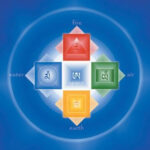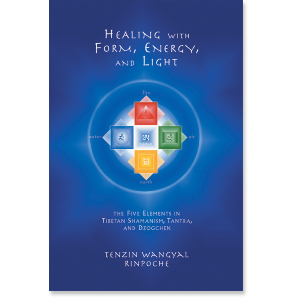| The following article is from the Spring, 2002 issue of the Snow Lion Newsletter and is for historical reference only. You can see this in context of the original newsletter here. |

BY POLLY TURNER
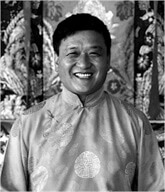
According to prominent Bon master Tenzin Wangyal Rinpoche, Bon tantra, dzogchen and shamanism today offer widely divergent approaches, yet they can be mutually supportive. All of them share at least one common essence: the integral view of the sacredness of the five elements of earth, water, fire, air and space.
Tenzin Rinpoche is author of Wonders of the Natural Mind, The Tibetan Yogas of Dream and Sleep and the new Healing With Form, Energy and Light: The Five Elements in Tibetan Shamanism, Tantra and Dzogchen. published by Snow Lion Publications. Rinpoche has been instrumental in introducing Bon teachings and traditions throughout the Western world since 1988. The center of his worldwide efforts is the organization he founded in 1992, Ligmincha Institute, in Charlottesville, Virginia. Ligmincha's affiliated centers and practice groups are now located throughout the United States, Russia, Mexico, and Eastern and Western Europe.
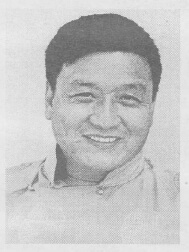
Above photo: Tenzin Wangyal Rinpoche (Photo by Jane Guldener)
Here, in an interview conducted by Polly Turner, editor of Sangha Journal, Rinpoche speaks on his latest book and the relevance of the five elements to a person's spiritual development.

Why have you chosen to write a book on the five elements?
The purpose of the book is to show how the sacredness of the elements can be discovered in every dimension of experience. One can experience the sacred in oneself in relation to these elements through connecting, or experiencing, or being. The shamans connect with nature. The tantric practitioner experiences energy, and the dzogchen practitioner experiences a quality of abiding in the five pure lights and five pure presences.
How would you define sacred in this context?
Sacred means any situation where you encounter something that makes the experience of your self deepest and closest. For example, when shamans see a mountain, their experience of themselves fully manifests in relation to the mountain and the earth element, and this evokes devotion. The earth is where things grow, where beings live. The raw force of this earth is not only seen in the spirit of the earth mother, it is also respected as a higher entity and source of healing.
For shamans the earth is sacred earth, water is sacred water, fire is sacred fire, air is sacred air, space is sacred space. Modem society has almost entirely lost this meaning in nature. Land is seen only as a place to buy and to build. When you are in the streets of New York City, nearly every single inch is solid cement and pavement—there's almost no connection with nature there.
The shaman relates with the elements of nature in a gross, dualistic, very spirit-oriented way, but still in a way that is amazing and powerful.
In tantra, through the visualization of syllables and symbols, channels and chakras, the same five elements are experienced in the human body in the form of divine energy. Every part of our body is seen as a palace of the divine. When you see that way, feel that way, relate that way, you have that sacred dimension of experience.
It's the same thing in dzogchen, but on the level of the mind. In dzogchen, the practitioner works with all the elements as light. In their subtlest quality, the elements at this level are five sacred aspects of the luminosity that, inseparably united with emptiness, is the basis of everything. In dzogchen the elements also are associated with the five wisdom qualities, or pure presences. For example, the water element is associated with blue light and with mirror-like wisdom. The space element is associated with white light and with the wisdom of emptiness.
Is it important for a practitioner to personally experience the elements as being balanced?
There is nothing to experience in any dimension that is not composed wholly of the interactions of the five elements. Different elements are associated with different emotions, temperaments, colors, illnesses, thinking styles, and so on.
One might say that if the elements are balanced externally, then one will be physically healthy. From a tantric perspective, when elements are balanced, maybe internally one feels joy, one feels love, one feels compassion, one feels balance or equilibrium. One experiences all of these more spontaneously. In dzogchen when one has balance in the elements, one spontaneously experiences different quality of space and light. Grounding, flexibility, openness, creativity—all of these qualities are experienced as subtle aspects of the primordial energy of existence.
Generally, shamans will not have understanding of the view of tantra or dzogchen. And, a dzogchen or tantric practitioner will not necessarily go into the sweat lodge and invoke the fire god, for example. But in both dzogchen and tantra, there definitely is a need of the inner heat to develop the awakening experiences of clarity, and a need to experience the inner bliss through fire.
One connects in a raw level, one connects on a more energetic level, one connects on a more pure level of mind and light.
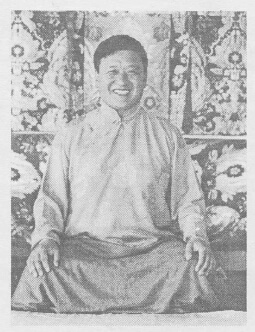
Tenzin Wangyal Rinpoche (Photo by Jane Guldener)
How can someone know if they have too much or not enough of any one element?
On the level of the raw elements, imbalance can manifest clearly in the physical dimension. Some people with too much earth element might be fat, for example. On an energetic level they may feel lazy, dull or depressed. Psychologically or internally, people might have so much earth they will forget things, be very slow, or have very little progression in their personal or spiritual development.
The imbalance of the elements from the dzogchen perspective is more on the very subtle level of the individual. Maybe somebody will have lack of stability in meditation, lack of awareness of their connection to the base, lack of concentration, lack of understanding of sunyata. Maybe a person is very unbalanced in a sense of the elements in dzogchen, but he or she might not notice it because there's nothing particularly wrong physically or psychologically.
If there are a lot of places in your day-to-day life where you feel confused or run into problems, maybe it's because of a lack of stability and the earth element—or maybe it's lack of creativity, meaning you're lacking the fire element. Or maybe it's very much lack of openness—if you feel shut down, basically it's because of lack of space. Lack of the air element can manifest as lack of flexibility. Having too much of any one element also can cause problems. When you see the kinds of conditions and qualities that are manifesting, you can look within yourself and understand the causes on a deeper, emotional level.
What causes this imbalance to happen in the first place?
In some sense, in the beginning of our lives we do have pretty much a balance of elements. As we go out to face the world, we have so many good experiences and bad experiences, disappointments and hurts. We have so many intense experiences, but we don't necessarily have a way of processing them. As a result, these experiences can damage some of these elemental qualities. Maybe you have stability and then something tragic or traumatic happens; from there on you just don't feel very well grounded any more.
If you have a very strong experience and are able to process it, it won't do anything to you. Being able to process means that you can feel it anyway, but it will not damage you. It will not change you. It will not weaken you. It will not make you lose some qualities. Being able to process means that it will energize you. You are clear with it. In some sense it can make you grow, make you expand your consciousness, make you become wiser and more understanding.
Not being able to process means that it will shake you. If you are quite a strong person and you are hit by that experience, it will take your strength away. Maybe you were happy; when you face it, it will take your happiness away. Somehow it will damage that particular quality.
The five negative emotions of anger, desire, ignorance, jealousy and pride are related with the elements, too. Anger is related with air. Desire is related to fire, and so on. When one is more balanced, one can have more experiences of love. When one is unbalanced because of too much air and lack of earth or grounding, one can have an experience of anger instead. Anger feels like an explosion outward, like air blowing things away—you lose control. This is opposite the experience of when you get depressed, because of too much earth and not enough air.
How can someone know when they're connecting in a pure way with the elements?
As you actually retrieve the elements you need, the feeling may not be obvious in the beginning. But in time, it can shift your life. You can see the way you relate and the way you do things are totally different. If you're ungrounded and feeling like you are messing up everything in your life, after you do the practice to retrieve the earth element, feel so different, so grounded.
You can retrieve the element by using a shamanic approach, a tantric approach or a dzogchen approach. The shaman basically tries to understand the energy of the earth, drawing the quality of the earth element from the earth goddess, the earth spirit, or by connecting more with the raw earth. There are a lot of forms of shamanic practices. It's the same with tantric: There is meditation, contemplation, specific exercises to try to control the dominating qualities of the air, fire, and other elements. Dzogchen practices involve simply abiding, or being, while merging oneself with the most subtle qualities of the elements.
Is it crucial to be aware of the elements at the time of death?
Generally, there's no other way to experience than through the elements. Teenagers have a need for a lot of fire and air, so when they're able to run off and explore new experiences, they feel like they're in heaven. When you're getting older, you need more of the earth or water element, associated with stability and with comfort. You don't want to explore too much, and you experience your deepest sense of self when lying on the bed or sofa So, during different times, different seasons, different emotional states, you have very different ways of connecting with yourself through the elements.
In the same way, during the dissolution of the elements at the time of death, we have the opportunity to experience our true self. We always experience ourselves through gross elements. But through the experience of death, as earth dissolves into water, water into fire, fire into air, and air ultimately into space, the experience of the elements naturally gets subtler and subtler. In order to achieve liberation in the bardo, one aims to experience one's self during the entire dying process, maintaining clear presence in the subtler forms of elements and in the very subtlest element form of light, and even in the clear light of space.
Maintaining this presence through these levels of experience is veiy difficult. So this is why it's important to be familiar with the practices of the elements, and to have understanding, knowledge, and experience.
[Polly Turner is a longtime student of Tenzin Wangyal Rinpoche and editor of Sangha Journal: Bringing the Tibetan Spiritual Traditions to Life, a new, bimonthly publication that provides support and inspiration to practitioners of Tibetan Buddhist and Bon meditation. For more information about Sangha Journal visit www.sanghajournal.com.]

